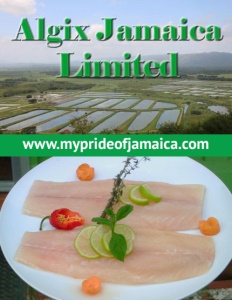Algix Jamaica Ltd.
Caribbean fresh
Business View Caribbean interviews Noel Thompson, Managing Director of Algix Jamaica Limited, for our focus on Business Excellence in Jamaica.
Algix Jamaica Ltd. is located on Barton Isle in beautiful St. Elizabeth, Jamaica. The thriving, four-year-old aquaculture farm operates on 300 acres of lush land with over 120 acres of ponds and is committed to the growth and maintenance of Jamaica’s precious resources: its environment, people, and culture. Since day one, Algix Jamaica has partnered with Caribbean Producers Jamaica (CPJ) to distribute the Algix brand “Pride of Jamaica’ fish to the hospitality industry and local consumers throughout the island.
Believing you are what you eat, Algix is focused on growing the healthiest possible fish, which currently include tilapia, pangasius Kai (known locally as basa), and the latest offering – freshwater shrimp. For feed, the company uses a one-of-a kind floating pellet, certified as pathogen-free by the USDA (U.S. Dept. of Agriculture) that ensures fish are eating at the top of the water and not the bottom. The feed is loaded with vitamins and minerals, contains no hormones, and is environmentally sustainable. Water is supplied from the Black River to the farm’s ponds, most of which are flow-through, with only nursery ponds being stagnant. The ponds are continuously replenished with crisp, clean water to ensure the fish grow in a healthy environment. Due to the higher water quality, Algix is able to stock more fish at higher densities in each pond.
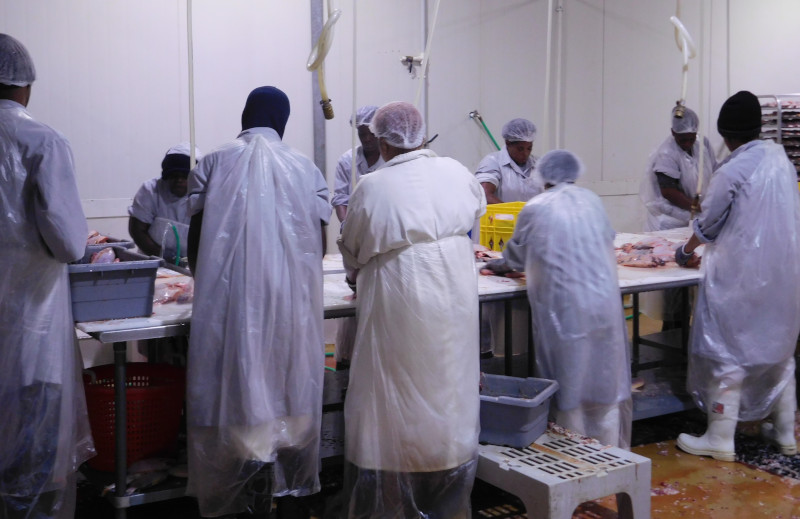
Processing Floor
A state-of-the-art processing facility located on the farm property allows maximum efficiency and productivity. The plant meets all international standards required for exporting to the U.S. and Europe. Fish can be processed within minutes of being harvested from the ponds and ready to enjoy within hours, ensuring that quality and consistency will exceed expectations. The average size of the tilapia fish is 250 to 350 grams, noted by the Ministry of Agriculture and Fisheries as the “ideal dinner plate size.”
As Operations Manager of Algix Jamaica, Noel Thompson knows full well the intricacies of running a large aquaculture operation on an island country. He reports, “Aquaculture involves growing and harvesting fish in a controlled water environment. When our US-based parent company, Algix, bought the Jamaica property in 2015, it was strictly a tilapia farm. Then they introduced pangasius (a fish from S.E. Asia that we call Basa), and, recently, we’ve added freshwater shrimp to the operation. In 2017, we received a veterinary license from the Ministry to export fish. We can export anywhere in the world, including Europe, however there are some issues with exporting Basa to the U.S. at this time. Our veterinary division and the USDA are working on that.”
Currently, Algix Jamaica is just producing fish for regional hotel markets and local consumption. Rather than retailing the product themselves, Algix uses distributors, and some of those sell into the Caribbean under different brands. Caribbean Producers Jamaica, the main distributor, has its own labelling –Nation’s Choice and Rainforest Seafoods – so, Algix packages under their labels.
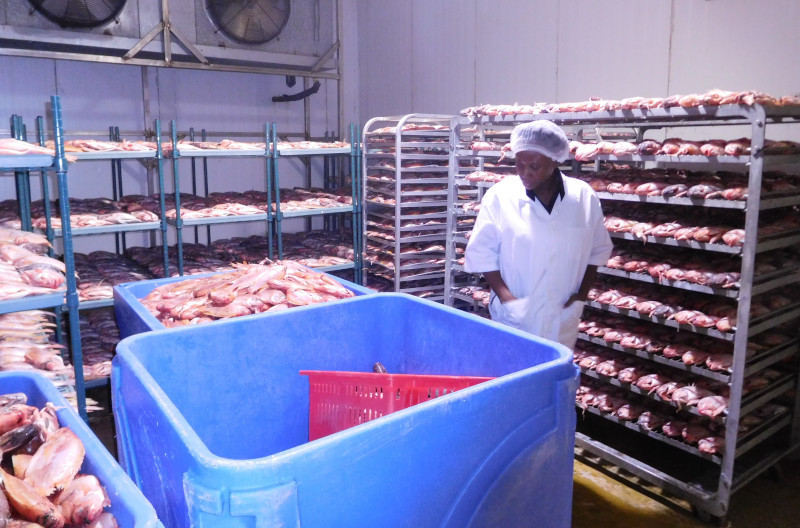
Blast Freezer Inspection By The Plant Manager
All three species, red tilapia hybrid, pangasius (basa), and freshwater shrimp are produced at the farm site, including the breeding, nursery production, processing, and marketing. The hatchery is usually indoors, and other facilities are outdoors. The vast property encompasses roads, reservoirs, and about 120 acres of productive space. From that acreage, 75 to 80 metric tons of fish are produced on a monthly basis. The operation employs 100 regular workers – making Algix a valued employer in an area where not many other jobs are available.
Competition is always on the radar, according to Thompson. He explains, “A lot of our distributors also import fish from other countries to sell. That is one form of competition. There are also some smaller farms that produce tilapia, but none producing basa or shrimp. For those two species, we have no competitors. One of our advantages is, if you get into the fresh market there isn’t much competition because the importers bring in a frozen product, whereas, we are able to supply fresh, or freshly frozen, to the hotels and the local trade. Each of our distributors gives us their packaging material, we package into their containers, and they use refrigerated trucks to move it to different locations.”
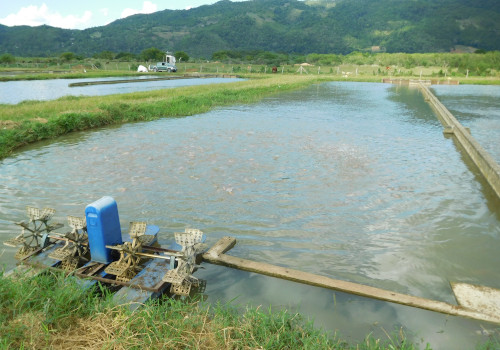
Fish Feeding
Much of the imported seafood, other than tilapia, comes into Jamaica duty-free from CARICOM countries, such as Guyana, Belize, and Suriname. “It’s something we have to live with,” says Thompson. “One way of dealing with it is by selling fresh product. The other major challenge we face is the high security expense. Because we have a valuable product in open ponds, we need security 24 hours per day, and that is pretty costly. On the positive side, finding workers is not difficult. There are more people seeking employment than what we can employ.”
The freshwater shrimp operation is only a few months old. Before looking into any other product expansion, the company wants to increase efficiencies and be as competitive in that sector as possible. The shrimp (macrobrachium rosenbergii), known locally as freshwater prawn, will be on the market in the next three months, and is of great interest to the hospitality industry. Thompson extolls the exceptional partnership with Caribbean Producers, based in Montego Bay, as a key component of his company’s success. “They have partnered with us since the beginning in 2014. They supply all different products to the hotels, from wine, to utensils, to food, and they move most of our product.”
Environmental sustainability is paramount to the aquaculture industry. Algix Jamaica operates under several license and permits, including one from the National Environmental Planning Agency. Algix is required to submit reports to them on a regular basis. Testing is done every fortnight. Thompson clarifies the procedure. “Basically, we take water from the Black River and we have to put it back into the river at the same standard. After using the water, we employ a treatment process that gets the water back into the environment safely, and with a good quality. We have to abide by those regulations and we are happy to do so.”
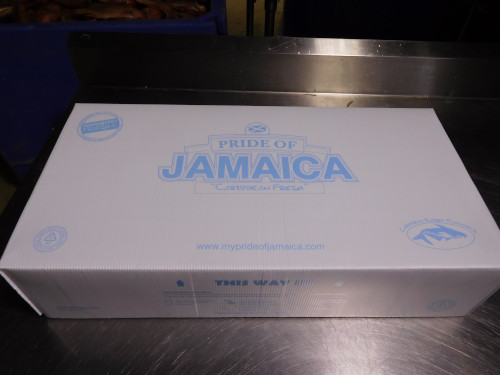 When Algix originally acquired the fish farm, there was a similar operation in place. Today, the company is using the same natural filter technology – a tail reservoir that filters the water and allows sedimentation to take place, and also pulls back nutrients from the water. It’s a natural biological treatment for water conditioning. The treatment is done in a designated 40-acre area, after which the clean water is discharged back into the Black River.
When Algix originally acquired the fish farm, there was a similar operation in place. Today, the company is using the same natural filter technology – a tail reservoir that filters the water and allows sedimentation to take place, and also pulls back nutrients from the water. It’s a natural biological treatment for water conditioning. The treatment is done in a designated 40-acre area, after which the clean water is discharged back into the Black River.
As for Algix Jamaica’s objectives over the next five years, Thompson shares, “First, we just want to increase efficiencies here. We have another location in Clarendon that we also own but, right now, we’re getting our current site in full operation, then we’ll move on to the next. After that are all kinds of possibilities. The Clarendon location is closer to other smaller farms, so we may start looking at the option of contract farming. Production-wise, we want to get our feed conversion ratio down. Currently, it’s expensive to buy the water and the feed – we want to reduce the unit cost of production somewhat and then have the technology at a level where we’re comfortable. At that stage we’ll be ready to move ahead.”
Thompson is proud of the company’s achievements after only four years in operation, and rightly so. “Algix Jamaica is the largest fish producer in the English-speaking Caribbean. We produce approximately 70 percent of the fish grown in Jamaica, and 98 percent of our employees are from the area. Nothing in the industry compares.”
Check out this handpicked feature on Caribbean Heart Care Medcorp – Trinidad.
AT A GLANCE
WHO: Algix Jamaica Ltd.
WHAT: Freshwater fish producer
WHERE: Barton Isle, St. Elizabeth, Jamaica
WEBSITE: www.myprideofjamaica.com




